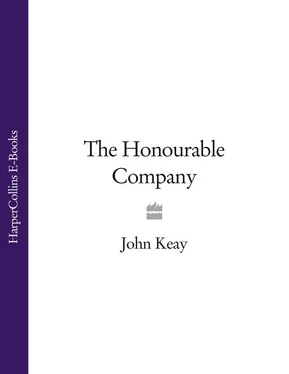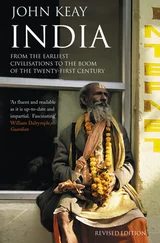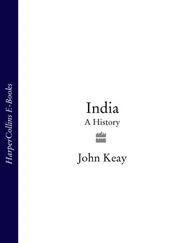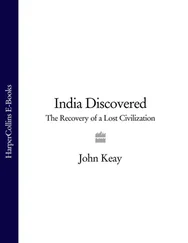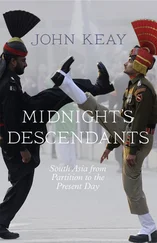The Honourable Company
John Keay

William Collins
An imprint of HarperCollins Publishers Ltd. 1 London Bridge Street London SE1 9GF
www.harpercollins.co.uk
First published in Great Britain by HarperCollins Publishers 1991
Copyright © John Keay 1991
John Keay asserts the moral right to be identified as the author of this work
A catalogue record for this book is available from the British Library
All rights reserved under International and Pan-American Copyright Conventions. By payment of the required fees, you have been granted the non-exclusive, non-transferable right to access and read the text of this ebook on screen. No part of this text may be reproduced, transmitted, downloaded, decompiled, reverse engineered, or stored in or introduced into any information storage and retrieval system, in any form or by any means, whether electronic or mechanical, now known or hereinafter invented, without the express written permission of HarperCollins ebooks
HarperCollins Publishers has made every reasonable effort to ensure that any picture content and written content in this ebook has been included or removed in accordance with the contractual and technological constraints in operation at the time of publication
Source ISBN: 9780006380726
Ebook Edition © JUNE 2010 ISBN: 9780007395545
Version: 2018-04-30
From the reviews of The Honourable Company:
‘What a marvellous story is that of the East India Company!…And John Keay tells it well, humanely and spicily, as well as all we need about organisation, background, etc…Mr Keay gives us the spectrum, the trade with China and Japan, the Arabian Gulf, the East Indies, India, the lot.’
A. L. ROWSE, Contemporary Review
‘Splendid, tumultuous narrative history…The sotry is so colourful, at least in its early stages, that it can be read as a bumper book of Indian adventure.’
ANTHONY QUINTON, The Times
‘A tale worth retelling in detail, when it is done with as much as flair and imagination as this.’
GEOFFREY MOORHOUSE, Guardian
‘A gem of a book on a vast and complex adventure of British trading, maritime and colonial history…highly recommended not only for scholars but to all those interested in an important segment of British and human history.’
Catholic Herald
‘Full of delicious anecdotes…fascinating reading.’
WILLIAM DALRYMPLE, The Spectator
For Alexander and Anna
Cover Page
Title Page
Copyright
Praise
Preface
PART ONE A QUIET TRADE 1600-1640
CHAPTER ONE Islands of Spicerie
CHAPTER TWO This Frothy Nation
CHAPTER THREE Pleasant and Fruitfull Lands
CHAPTER FOUR Jarres and Brabbles
CHAPTER FIVE The Keye of All India
PART TWO FLUCTUATING FORTUNES 1640-1710
CHAPTER SIX These Frowning Times
CHAPTER SEVEN A Seat of Power and Trade
CHAPTER EIGHT Fierce Engageings
CHAPTER NINE Renegades and Rivals
CHAPTER TEN Eastern Approaches
PART THREE A TERRITORIAL POWER 1710-1760
CHAPTER ELEVEN The Dark Age
CHAPTER TWELVE Outposts of Effrontery
CHAPTER THIRTEEN One Man’s Pirate
CHAPTER FOURTEEN The Germ of an Army
CHAPTER FIFTEEN The Famous Two Hundred Days
PART FOUR A PARTING OF THE WAYS 1760-1820
CHAPTER SIXTEEN Looking Eastward to the Sea
CHAPTER SEVENTEEN The Transfer of Power
CHAPTER EIGHTEEN Too Loyal, Too Faithful
CHAPTER NINETEEN Tea Trade Versus Free Trade
CHAPTER TWENTY Epilogue
Keep Reading
Bibliography
Index
Acknowledgement and Author’s Note
About the Author
By the Same Author
About the Publisher
A hundred years ago the high-minded rulers of British India regarded merchants as a lesser breed in the hierarchy of imperial pedigree. To ‘gentlemen in trade’, as to servants, ladies, natives, dogs, the brass-studded doors of Bombay’s and Calcutta’s more exclusive clubs were closed. Like social climbers raising the ladder behind them, the paragons of the Raj preferred to forget that but for the ‘gentlemen in trade’ of the East India Company there would have been no British India.
The Honourable Company was remembered, if at all, only as an anomalous administrative service; and that was indeed what it had become in the early nineteenth century. But before that, for all of 200 years, its endeavours were seen as having been primarily commercial, often inglorious, and almost never ‘honourable’. Venal and disreputable, its servants were believed to have betrayed their race by begetting a half-caste tribe of Anglo-Indians, and their nation by corrupt government and extortionate trade.
From those 200 years just a few carefully selected incidents and personalities sufficed by way of introduction to the subsequent 150 years of glorious British dominion. Occasionally greater attention might be paid to the Company’s last decades as an all-conquering force in Indian politics, but still the perspective remained the same: the Company was seen purely as the forerunner to the Raj.
Closer acquaintance reveals a different story. The career of ‘the Grandest Society of Merchants in the Universe’ spans as much geography as it does history. To follow its multifarious activities involves imposing a chronology extending from the reign of Elizabeth to that of Victoria upon a map extending from southern Africa to north-west America. Heavy are the demands this makes on both writer and reader. (And hence perhaps the dearth of narrative histories of the Company in this post-imperial age.) But the conclusion is inescapable. The East India Company was as much about the East as about India. Its Pacific legacies would be as lasting as those in the Indian Ocean; its most successful commercial venture was in China, not India.
Freed of its subservient function as the unworthy stock on which the mighty Raj would be grafted, the Company stands forth as a robust association of adventurers engaged in hazarding all in a series of preposterous gambles. Some paid off; many did not but are no less memorable for it. Bizarre locations, exotic produce, and recalcitrant personalities combine to induce a sense of romance which, however repugnant to the scholar, is in no way contrived. It was thanks to the incorrigible pioneering of the Company’s servants that the British Empire acquired its peculiarly diffuse character. But for the Company there would have been not only no British India but also no global British Empire.
PART ONE A QUIET TRADE 1600-1640
CHAPTER ONE Islands of Spicerie
THE VOYAGES OF JAMES LANCASTER
Every overseas empire had to begin somewhere. A flag had to be raised, territory claimed, and settlement attempted. In the dimly perceived conduct of a small band of bedraggled pioneers, stiff with scurvy and with sand in their hose, it may be difficult to determine to what extent these various criteria were met. There might, for instance, be a case for locating the genesis of the British Empire in the West Indies, Virginia, or New England. But there is a less obvious and much stronger candidate. The seed from which grew the most extensive empire the world has ever seen was sown on Pulo Run in the Banda Islands at the eastern end of the Indonesian archipelago. As the island of Runnymede is to British constitutional history, so the island of Run is to British imperial history.
Читать дальше
